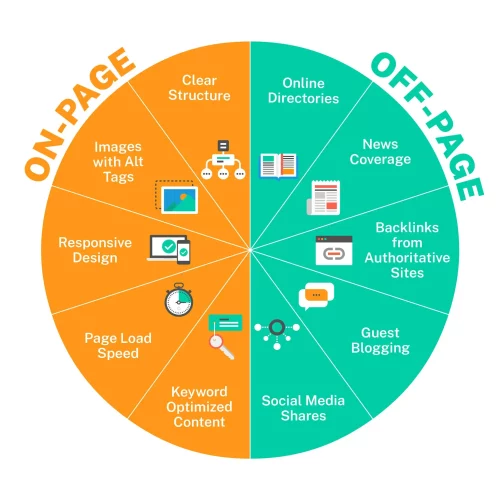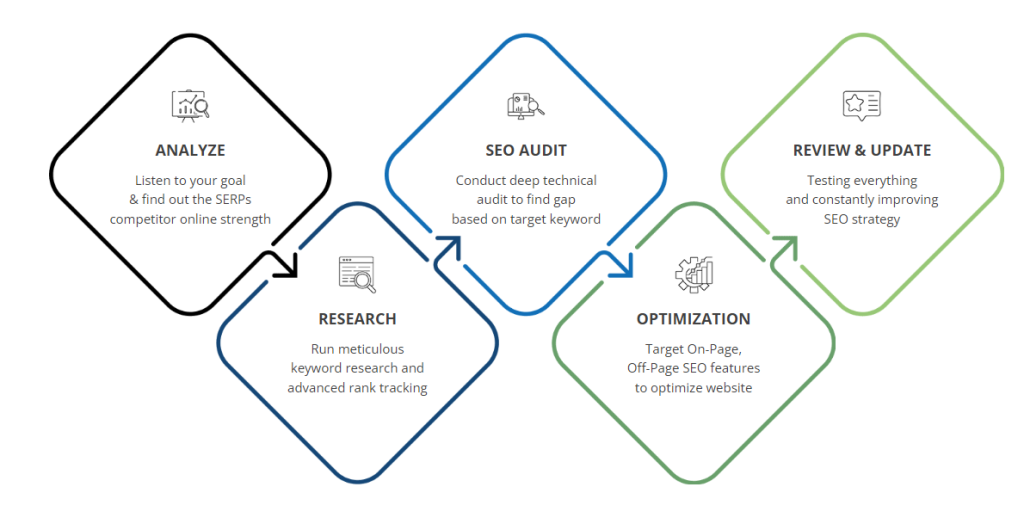SEARCH OPTIMA IS SEO SERVICE PROVIDER AGENCY
YOUR BRANDS
In this day and age of technology, having a solid online presence is essential for any business looking to be successful and expand. This is where Search Engine Optimization (SEO) is in the picture. SEO isn't simply a buzzword, it's an important strategy that can greatly impact your website's visibility traffic, as well as, eventually the leads and sales. Our long-standing success in increasing sites' search engine visibility and bringing quality traffic to your site has always resulted in higher leads and sales. Visit SEO Service Provider Agency Search Optima.

WE ARE SEO SERVICE PROVIDER AGENCY CREATE YOUR DIGITAL EXPERIENCE THAT EXCITES AND INSPIRES
In today's fast-paced and competitive online world, having an effective online presence is crucial for businesses looking to grow and prosper. This is the point at which SEARCH OPTIMA SEO Services Provider Agency can help and offer a broad range of SEO marketing services that are designed to assist you in conquering your digital landscape and standing out from your competitors.
KNOW FROM SEO SERVICE PROVIDER AGENCY SEARCH OPTIMA WHAT ARE THE STEPS REQUIRED TO RANK A WEBSITE?
SEO Service Provider Agency “Search Optima” implements a comprehensive SEO (Search Engine Optimization) strategy that includes various steps and best practices to rank a website in search engine results. Here are the steps required for ranking a website:
Keyword Research: Identify relevant keywords and phrases related to your website's content and target audience. Use tools like Google Keyword Planner, SEMrush, or Ahrefs to discover high-value keywords.
On-Page Optimization: Optimize your website's on-page elements, including titles, headings, meta descriptions, and content, to incorporate your chosen keywords naturally. Ensure that your website is well-structured, user-friendly, and mobile-responsive.
Quality Content Creation: Develop high-quality, valuable, and engaging content that addresses the needs and interests of your target audience. Regularly update your content to keep it fresh and relevant.
Technical SEO: Address technical issues that can affect your website's performance and user experience, such as page speed, mobile-friendliness, and indexing. Create and submit a sitemap to search engines.
Link Building: Build high-quality backlinks from reputable and relevant websites. Focus on acquiring natural, authoritative links through outreach, guest posting, and content promotion.
User Experience (UX) Improvement: Enhance the overall user experience of your website by improving navigation, reducing bounce rates, and ensuring that visitors can easily find the information they seek.
Social Signals: Maintain an active presence on social media platforms and encourage social sharing of your content. Social signals can indirectly impact SEO rankings.
Regular Monitoring and Analytics: Use tools like Google Analytics and Google Search Console to monitor website performance, track keyword rankings, and identify areas for improvement.
Mobile Optimization: Ensure that your website is mobile-responsive and provides an excellent user experience on smartphones and tablets, as Google gives preference to mobile-friendly websites.
Schema Markup (Structured Data): Implement schema markup to help search engines understand the content on your website better. This can lead to rich snippets in search results, improving click-through rates.
Continuous Improvement: SEO is an ongoing process. Regularly review and adapt your strategy based on changing search engine algorithms, industry trends, and user behavior.
Competitor Analysis: Keep an eye on your competitors' strategies and rankings. Analyze their successful tactics and adapt them to your own SEO efforts.
Remember that SEO is a long-term effort, and it may take time to see significant results. Consistency, patience, and a commitment to best practices are key to achieving and maintaining high search engine rankings.





MEET THE SEARCH OPTIMA THAT BRINGS YOU
SEO SERVICE PROVIDER AGENCY SEARCH OPTIMA HELPS YOU REACH PAGE 1 ON GOOGLE TO DRIVE TRAFFIC AND SALES
Obtaining a position on the top of Google results has become an essential target for businesses looking to succeed online. With millions of potential customers using search engines to find their products or services, the importance of being on the first page cannot be overemphasized. We at our SEO service provider agency are aware of this vital fact and have refined our skills to provide results that generate high-quality traffic, increase leads, and increase sales for your company. Stay with SEO Service Provider Agency Search Optima to achieve the best success in online Business.




























THE POWER OF FIRST-PAGE RANKING
In the bustling realm of the internet, where countless websites vie for attention, the significance of securing a spot on the coveted first page of search engine results cannot be overstated. The power of Google First Page Ranking is a force that can reshape the fate of businesses, shape online visibility, and usher in success like never before.
SEO SERVICE PROVIDER AGENCY SEARCH OPTIMA HOW WE RANK AT THE TOP OF SEARCH RESULTS IN 2023
2023 will be about creating an extensive SEO & ASO Service to improve the search ranking to bring in more organic traffic to your website and the app. We are the leading SEO service provider agency that provides industry-leading SEO solutions across the globe. The SEO Services will help you to rank highly in the results of searches.SEO is more efficient than traditional advertising. We assist you in increasing your traffic, leads, and sales with our white label SEO solutions.
The creation of an SEO-friendly structure for your website and optimizing the organization of data is crucial in today’s digital world. A well-structured website improves the users’ satisfaction by making navigation easy and the content accessible. Making clear the hierarchy between categories, and subcategories, as well as an orderly linking structure, does not just assist users to locate the information they’re looking for, but also assists crawlers of search engines find your site’s content more efficiently. Additionally, using clear and concise URLs and relevant keyword and detailed metadata titles as well as descriptions could greatly impact click-through rates as well as ranking in search results. A solid data schema, like schema markup, will provide search engines with relevant information regarding your content, leading to increased search engine visibility through rich snippets as well as other search results features. The importance of mobile responsiveness, speedy loading times, and high-quality, interactive content in this structured structure will lead to increased engagement of users and the performance of your search engine.
User-first is now Google’s main web fundamentals for 2021. To make your site more enjoyable, the components you must begin focusing on are loading speed interactivity, interactivity, as well as visual stability. eCommerce SEO is here to enhance the ecommerce website’s dwell time. Dwell time refers to the length of time people look over your website before deciding to come to the search results page.
If your website is struggling to appear to the top of the search engine, it means there is a problem with the user experience, which results in a low dwell time. The user experience is essential in boosting the visibility of your SERP.
Hire the most reliable SEO firm that can assist you achieve the best user experience during your journey through SEO.
How you organize and create your content will have an immediate influence on how users interact on the site. It’s crucial to consider the purpose of the user and choose the words that your audience would most like to utilize.
Each year Google is constantly updating its algorithms to assess the users’ intentions when they search results. RankBrain is the core algorithm of Google’s component that determines the appropriate results for the searches. To fully comprehend this Rank Barin, you must comprehend the Google intent behind the search. Content plays the biggest role in the games.
Google’s aim is to give users with by providing the best possible results. our aim is to provide valuable information that is easy to access and valuable to the user, and that aligns with the intent of search.
Google’s aim is to give users the most relevant results. Our goal is to provide important information that is readily accessible and helpful to the user, and that is in line with the intent of search.
How you organize and prepare your content will have an immediate impact on user behavior on your site. It is important to know the intent of your users and to use the words your visitor would most like to be using.
Each calendar year Google is constantly updating its algorithms to identify the user’s intention to search results. RankBrain is Google’s primary algorithm element that determines the most relevant results of searches. To fully comprehend this Rank Barin, you must comprehend the Google search engine’s intent. Content plays the biggest role in the games.
Google’s goal is to provide users with by providing the best possible results. our goal is to provide the most valuable information that is accessible and beneficial to the user, and that is in line with the intent of search.
Google’s aim is to give users with best results. our aim is to provide valuable information that is accessible and valuable to the user, and that aligns with the purpose of search.

